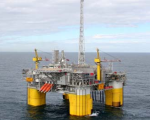The world’s largest oil companies from Royal Dutch Shell to Exxon Mobil are likely to reassess deals to drill in Ukraine where political crisis is threatening a promising source of new profits as well as the country’s drive for energy independence.
Shell and Chevron signed agreements last year to drill unexplored shale formations in Ukraine, offering the chance to upgrade the country’s energy infrastructure and boost domestic production, thus reducing the amount of gas imported from Russia. Before the crisis erupted last year, Exxon, the largest U.S. oil company, was also close to signing a pact to explore the Black Sea.
While the oil companies can spend their money in other countries, the investment, which could eventually be worth more than $10 billion, is vital to Ukraine’s quest to pull away from Russian control and revive an economy on the verge of collapse after three months of violent protest.
“Ukraine is a no-go area for any investment from any foreign investor right now,” said Chris Weafer, senior partner at Macro Advisory in Moscow. “Investors need two critical conditions to invest in any emerging economy: political stability and economic predictability.”
At the moment Ukraine has neither. Parliament delayed a vote today on.
Shell and Chevron Corp. signed agreements last year to drill unexplored shale formations in Ukraine, offering the chance to upgrade the country’s energy infrastructure and boost domestic production, thus reducing the amount of gas imported from Russia. Before the crisis erupted last year, Exxon, the largest U.S. oil company, was also close to signing a pact to explore the Black Sea.
While the oil companies can spend their money in other countries, the investment, which could eventually be worth more than $10 billion, is vital to Ukraine’s quest to pull away from Russian control and revive an economy on the verge of collapse after three months of violent protest.
“Ukraine is a no-go area for any investment from any foreign investor right now,” said Chris Weafer, senior partner at Macro Advisory in Moscow. “Investors need two critical conditions to invest in any emerging economy: political stability and economic predictability.”
At the moment Ukraine has neither. Parliament delayed a vote today on appointing a government of national unity to fill the void left by President Viktor Yanukovych’s exit. Its first priority will be to negotiate an economic aid package to fend off default, replacing cash Russia had promised the old regime.
If Ukraine achieves a measure of political stability, a new government will want to pursue gas drilling given Russia’s negative reaction to Yanukovych’s overthrow, said Andrew Neff, an analyst at IHS Energy in Moscow.
“Ukraine will have to engage productively with foreign energy companies going forward if it has any hope of reducing that dependence on Russian gas,” he said.
The Hague-based Shell plans to drill as many as 15 wells over the next five years to appraise the potential of the Yuzivska field, spread over 3,100 sq mi of eastern Ukraine. Spending on the project could rise to $10 billion if it reaches production, the government said last year.
The company said in a statement that operations haven’t been affected by the unrest.
Chevron, the second-largest U.S. oil company, has a similar agreement for the Oleska shale formation, where it pledged to spend $400 million on drilling. The San Ramon, California-based company said in a statement that it’s closely monitoring the situation in Kiev and has taken appropriate precautions to ensure the safety of staff and their families.
Exxon was close to signing an agreement to drill exploration wells in the Skifska area of Ukraine’s part of the Black Sea before the current crisis erupted. The deal, which would have seen Exxon commit $735 million to drill just two offshore wells, remains in limbo.
Even if drilling continues, production on a significant scale will take several years and the threat remains that Russia will use energy to maintain its influence over Ukraine - its goal since protests first started in Kiev last year, when Yanukovych ditched a deal to strengthen ties with the EU.
“Ukraine is still very reliant on energy from Russia,” said Leslie Holmes, professor of political science at the University of Melbourne. “So Russia still has a trump card up its sleeve.”
Providing useful resources, articles and writings on crude oil, other petroleum products, energy and gas. By O'Niel Petroserve Nigeria Ltd, online.

 O'NielPetroserve is a leader in the of Nigerian Bonny Light Crude Oil (BLCO) sales market. As a privately held company, O'Neil Petroserve is committed to and is focused on delivering reliable services to all her clients.
O'NielPetroserve is a leader in the of Nigerian Bonny Light Crude Oil (BLCO) sales market. As a privately held company, O'Neil Petroserve is committed to and is focused on delivering reliable services to all her clients.  O'Neil Petroserve has an excellent track record of reliability in the supply of Bonny light crude oil, BLCO. We protect our buyers with 2% Performance Bond while we also expect protection from our customers with bank instrument from the world's top banks. We deliver on TTO, TTT, CIF and FOB basis.
O'Neil Petroserve has an excellent track record of reliability in the supply of Bonny light crude oil, BLCO. We protect our buyers with 2% Performance Bond while we also expect protection from our customers with bank instrument from the world's top banks. We deliver on TTO, TTT, CIF and FOB basis.

No comments :
Post a Comment